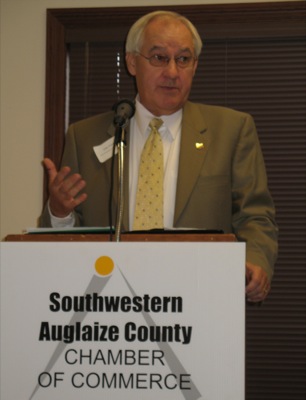Wednesday, October 17th, 2007
Mercer County engineer: Office addresses safety not water quality
By Nancy Allen
The Mercer County engineer's job is to address issues involving public safety, not water quality.
That's what county engineer Jim Wiechart told members of the Lake Improvement Association's Lake Restoration Committee on Monday night.
LRC members queried Wiechart about why the engineer's office doesn't do more to keep farmers from infringing on road rights of way with crops. Doing so would result in a wider grass strip between farm fields and roadways. These grass strips help keep excess sediment and nutrients from running off into ditches and the lake, sort of like a small filter strip, LRC members have said.
Wiechart said his office simply does not have the resources to police this, and he feels the grass strips do little to filter runoff. There is runoff from multiple places in farm fields, and underground tile also carries much of the runoff away, he said.
LIA member Bill Ringo proposed a trade-off. Let farmers continue to illegally plant crops in the road rights of way, but plant grass in large recharge areas, low-lying spots in fields where water runs to before going into a culvert or ditch, to help filter out sediment and nutrients.
"My revenues are predicated on public transportation and safety, not water quality," Wiechart said. "Is there any benefit in using gas tax revenues for water quality? My answer would be 'no.' "
The county engineer's largest revenue stream is taxes from gasoline and license fees, which can be spent only on public roads and transportation, Wiechart said.
County engineer employee Vern Eichler said such an area would have to be mowed and maintained, adding that "we can't even keep up with the mowing we have now."
Wiechart said the only time his office enforces any right of way infringement is if crops obstruct line of sight on roadways and can be considered a safety issue.
"If we have a problem with crops growing and causing visibility problems, we notify 'em and give 'em three days to do something," said engineer's office employee Mike Borns. "If they don't, we mow it."
Borns said the office receives six to eight complaints a year of this nature.
Wiechart said he also has concerns about a two-stage ditch design proposed as a way to decrease soil erosion. The design mimics a natural, meandering stream, which in theory slows down water and lessens bank erosion, but makes it more difficult to maintain a stream.
"My concern is if you get too much brush growth, it may choke off the ditch and flow," Wiechart said. "In areas with enough grade they may be self-cleaning, but in a lot of these flat areas we have here, I don't think it (two-stage ditch design) would work."
The county engineer's office is charged with maintaining county roads and bridges and petitioned ditches. The office also has 13 snow-plowing routes.
The next LIA meeting is 10 a.m. Nov. 3 at the Loyal Order of the Moose Lodge in Celina, and the next LRC meeting is 7:30 p.m. Nov. 19 at the same location.


